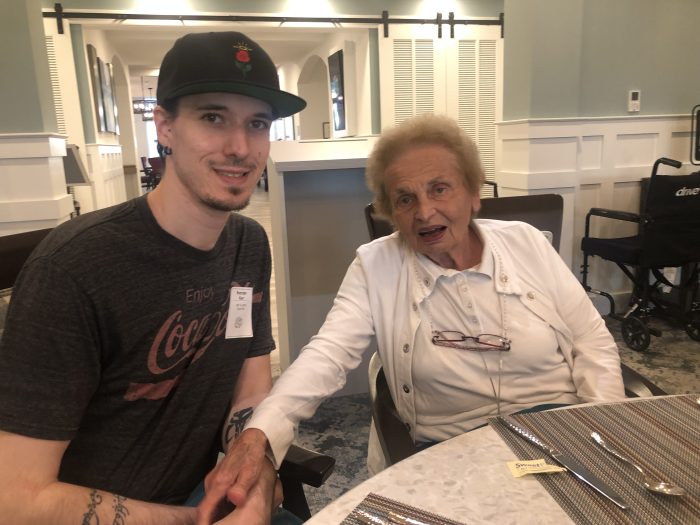After recovering from what we feared was an irrecoverable stroke, our 89-year-old mother continues to impart life lessons to me and my siblings; we’re taking them for as long as we can.
I sat by the hospital bed watching my 89-year-old mother attempt to fill out a simple crossword puzzle.
I’d handed her the beginner’s-level puzzle book to get a sense how badly she’d been affected by the series of mini-strokes she suffered the day before. Mom always loved doing crossword puzzles. She would fold the puzzle page at the back of the newspaper into a neat square and work on it during her day. There were few puzzles she didn’t finish. It was one of the things that had kept her mentally sharp over the years—which was why I was so worried seeing the vacant look in her eyes as she stared at the numbered boxes on the page. Now and then her pen would move, ever so slightly, before coming to a stop without writing anything.
After 10 minutes of staring, she pushed the book aside.
“I can’t do this right now,” she said with a frustrated sigh.
The nurse came in to try to get Mom to stand up on her own, but she was too weak. She had no memory of how she’d ended up on the floor of the upstairs bathroom or how long she’d been there before my sister found her.
For me and my five siblings, this was familiar territory. Three years earlier, we’d seen our father go down a similar path at the hospital, suffering stroke after stroke and growing increasingly disoriented. We ended up moving him to a hospice, where he wasted away for a grueling week before passing away.
We steeled ourselves for the very real possibility that Mom wouldn’t be coming back from this. Grandkids came for final visits. For the next few days, my siblings and I took turns sitting with her at the hospital, just as we had with Dad.
Thinking my time with her was coming to an end, I spent every minute I could with Mom, holding her hand, talking to her, thanking her for all she’d done for me. She and I had been down some hard roads together. Through my journey through depression, divorce, cancer, and various other misadventures, she’d been with me every step of the way, a picture of constant positivity. Everything I’d learned about the power of faith and prayer in getting through adversity had come from her.
She was my rock. The family’s rock. It didn’t seem possible she would no longer be around.
Then something miraculous happened. With some adjustments to her medicines, Mom slowly began to improve. She began talking more lucidly and remembering things. She was able to write her name. One day at the hospital, I held the puzzle book in front of her and read the clue:
“A five-letter word meaning ‘fast.’”
Her lips pursed the way they did when she was thinking. “Quick.”
“Right!” I said.
She returned my smile. My heart lifted. We weren’t losing her. Not yet.
I was witnessing the incredible ability of the human brain to rebuild itself after trauma.
Fortunately, Mom had not lost any of her speech or major motor functions due to the strokes, but she was extremely weak. The doctors recommended doing a stint at a rehab center to rebuild her strength.
At this point, my siblings and I had some tough decisions to make. Mom had been living alone at the old farmhouse since our father passed away. But even before the strokes, she was getting so frail that we were concerned about her being in the house by herself. Now, it was out of the question. In her condition, she would need 24/7 care and monitoring.
We looked into options and were fortunate to find an opening at a senior living community not far from where we live. It was a new facility, family owned and operated, with modern amenities and a cozy, lodge-like feel to it. As an added boon for our Catholic mother, the center was also affiliated with a local parish, and a priest came in every Sunday to say mass.
After a week of rehab, Mom moved into the center in June. Understandably, she was less than thrilled. In her mind, this new place was just another stop on her journey back to the old farmhouse that she’d called home for 56 years. We did our best to talk up the benefits of the center—the beautiful surroundings, the modern amenities, the quality of the food and the care, the social activities—but she could not be convinced. For the first two months, she continued to talk about this whole arrangement as being temporary.
We could see her frustration, her impatience. This was not where she wanted to be. But the reality was that she was still frail and required a walker to get around. She couldn’t even tie her own shoes without help. It was a hard thing to witness—seeing this woman who had always been so competent and independent, now suddenly unable to take care of herself.
In my visits with her, I found myself thinking of one of Mom’s favorite sayings over the years:
“It is as it is.”
How often we heard those words while we were growing up. There was no use worrying about things you can do nothing about, she was always reminding us. The future is an unknown; all we can do is take one day at a time. Whenever one of us was having a hard time, Mom would point to a plate that hung on the wall of our little kitchen. On that plate were the words of the Serenity Prayer, which encapsulated Mom’s philosophy toward handing the adversities that life so often throws our way:
God grant me the serenity to accept the things I cannot change,
Courage to change the things I can,
And wisdom to know the difference.
Those words were more than a prayer. They were a recipe for contentment. Acceptance, courage, wisdom: Just as you needed the right items to bake a good-tasting pie, so you needed all three of these ingredients to find peace in a turbulent world. And the recipe began with acceptance.
It is as it is.
I could see Mom fighting, pushing, testing herself and her limits. She was doing physical therapy at the center, diligently working with the therapist to build her strength. It was the determined part of her that we knew so well, the part that had given her the courage to confront challenges and change the things she could.
But as the weeks went by without much improvement in her physical condition, we could see her views about her situation start to soften. She began to see the benefits of this community where she was living. The place was beautiful, she said. The food was good. It was nice not having to worry about cooking or doing her own laundry. The people were nice too—the staff, the residents. She felt safe, watched over, protected.
One day after she’d been there for a few months, I heard her say the magic words:
“You know, Jim, as much as I would like to be at the farmhouse, I know I can’t be there on my own anymore. It’s not realistic. This is my home now.”
Acceptance.
It is as it is.
Mom has been in the senior community now for nine months. She no longer talks about going back to the farmhouse. When we offer to take her there for a visit, she doesn’t want to go. It would be too hard, she says—too hard to go back there to that empty house, full of ghosts of people and times past.
She has her memories and that is enough. She has come to like her well-lit apartment and the view of the sunsets. My sisters helped her decorate the place this past Christmas, her first holiday away from the farmhouse in five and a half decades. We sat with her, opened presents, ate cookies and had tea, just as we used to do at the old homestead.
She attends Sunday mass in the chapel. She is doing crossword puzzles again, as well as 500-piece jigsaw puzzles that she assembles on the table by the window. Her memory continues to wane, but then, she will be turning 90 in a couple months. Mom has even made some new friends at the center. One of them, Irene, is 103 years old and likes to take daily walks around the complex. Recently, Irene invited Mom along for one of her strolls.
Who knows how much more time we have with her? All I know is that my siblings and I have been given the precious gift of being able to spend more time with this person who is our rock and our hero.
Every extra day is a blessing, and we’re treasuring it.
~
Please consider Boosting our authors’ articles in their first week to help them win Elephant’s Ecosystem so they can get paid and write more.












Read 3 comments and reply